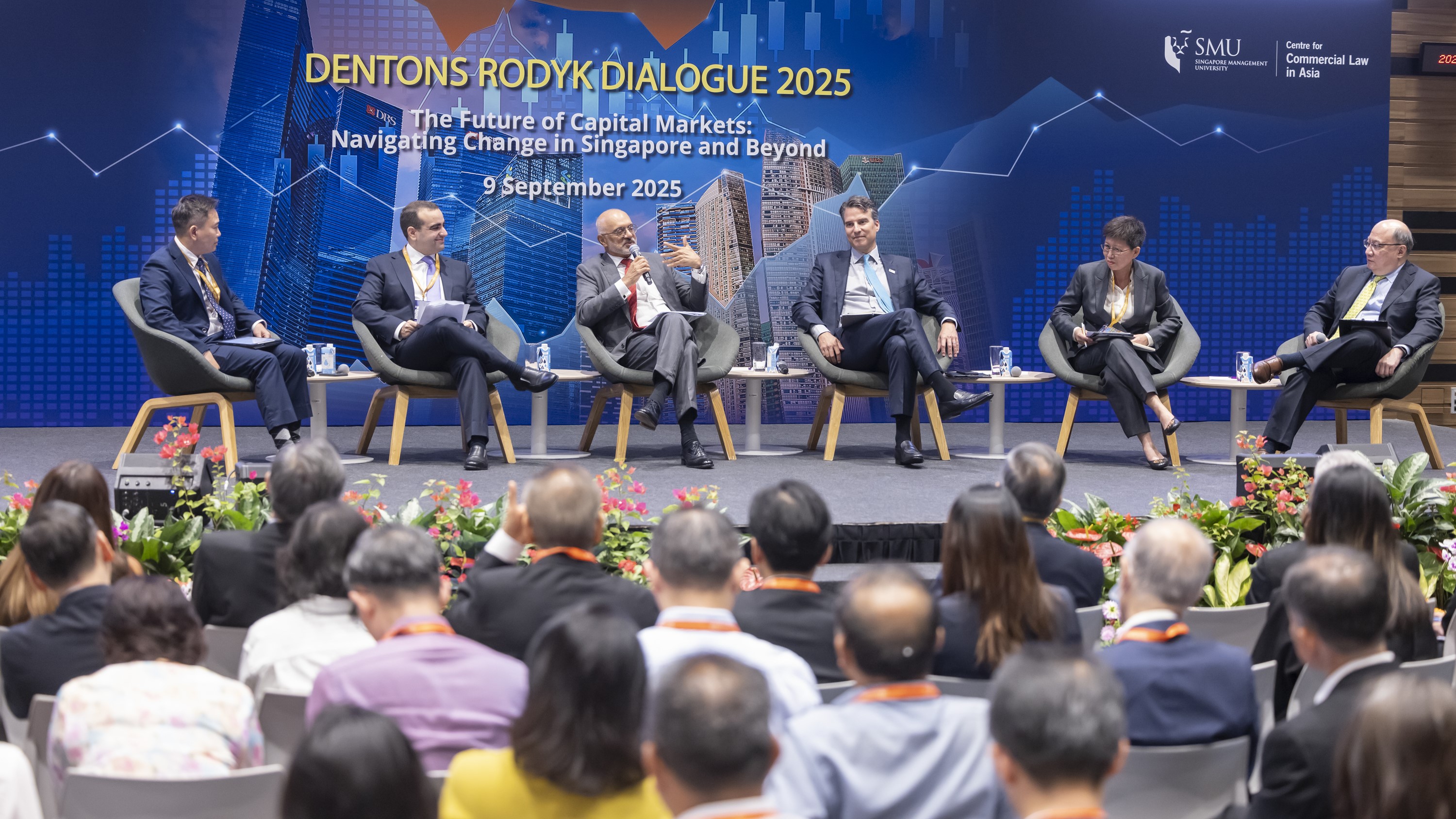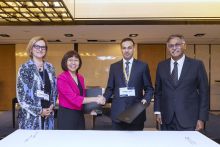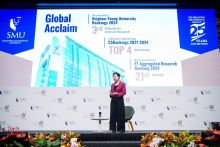SMU thought leadership on the future of Singapore’s capital markets

SMU thought leadership on the future of Singapore’s capital markets
On 9 September 2025, SMU’s Yong Pung How School of Law co-hosted the Dentons Rodyk Dialogue 2025, drawing nearly 400 industry, legal and academic leaders.
Titled “The Future of Capital Markets: Navigating Change in Singapore and Beyond”, the annual event focused on how Singapore’s capital-markets ecosystem is evolving in the face of technology, regulation and global shifts. As Singapore confronts these challenges, SMU is shaping the research agenda on how regulation, innovation and market design must evolve to secure the next phase of growth in capital markets.
It is the nineth year that global law firm Dentons Rodyk was partnering with SMU’s Centre for Commercial Law in Asia to bring together leaders from business, law, and academia to have conversations that matter and shape the future of markets, law, and policy in Singapore and the region.
Innovation as a catalyst for growth
In his keynote remarks, SMU Chairman Mr Piyush Gupta invited stakeholders to reimagine Singapore’s capital-markets architecture by fully harnessing technology. He highlighted how innovations such as asset tokenisation and AI-driven, real-time regulatory oversight could embed trust, disclosure, compliance, and enforcement directly into digital market infrastructure. This, he suggested, could unlock new possibilities for both companies and investors, reduce friction, and expand participation.
However, he cautioned that such innovation must rest on a strong legal foundation. “The future of capital markets will be written in code, with law as its foundation,” he remarked, emphasising the need for a dynamic and forward-looking regulatory framework to support technological adoption at scale.
Regulation and competitiveness: Insights from SMU scholarship
The Dialogue’s academic speaker, SMU Associate Professor of Law Aurelio Gurrea-Martínez, presented findings from his recent article, “Strengthening the International Competitiveness of Capital Markets: Global Insights and Local Strategies.” Using Singapore as a case study, his research examines how jurisdictions can make their public equity markets more competitive while navigating the rapid rise of private markets.
Drawing on the literature in law and finance and assessing Singapore’s framework from a comparative and economic perspective, he outlined proposals to make Singapore’s equity markets more attractive to both issuers and investors.
Legal-institutional strength
“While there is significant room for improvement in the equity capital markets, we must also recognise Singapore’s strengths, which include a strong legal and institutional framework as well as a vibrant and highly competitive financial system that supports innovation and growth,” said Assoc Prof Gurrea‑Martínez.
Yet, the equity market in Singapore faces real pressures — fewer listings, thinning liquidity. In response, Monetary Authority of Singapore (MAS) has introduced a S$5 billion Equity Market Development Programme (EQDP) aimed at revitalising the landscape.
Pol de Win of the Singapore Exchange (SGX) stressed: “Singapore has always thrived on continuous improvement, and our capital markets are no different.
“The $5 billion EQDP is a decisive step to attract liquidity, strengthen the mid-cap segment, and ensure globally competitive frameworks. With a robust supply of high-quality companies, increasing retail participation, and robust pipelines, I am confident that we will reverse our current situation. Singapore’s unique position, trusted by both East and West, gives us the platform to build the next chapter of global capital markets.”
He expressed optimism that Singapore is repositioning its depth, not just its stature — aiming not only for headline listings, but ecosystem resilience, cross-border appeal and innovative forms of capital raising.
Private-public convergence
The panel discussion brought together voices from law, finance, and advisory to examine how Singapore might bridge private and public capital, support RegTech and fintech innovations, and attract global listings tapping new capital flows.
They concluded that the future of Singapore’s capital markets lies not simply in more IPOs, but in the convergence of private and public, between Asia and global, between regulation and invention. The spotlight is, and should be, on creating frameworks that welcome change without sacrificing trust.
A moment of opportunity
At this crossroads, Singapore has both foundations and fault-lines. Its legal and regulatory systems are strong; its institutional credibility is solid. But the era ahead demands speed, boldness, and clarity. Singapore’s legal and regulatory architecture will be decisive in determining whether its capital markets merely adapt to change—or lead it. As capital flows evolve and technology reshapes market structure, law must enable innovation while safeguarding trust, transparency, and stability.
If Singapore aims to anchor the future, it must marshal innovation with integrity, tech with tradition, opportunity with oversight. The true test will be in follow-through: how quickly instruments evolve, how readily capital flows, how trust is maintained as structures shift.
Through the SMU Centre for Commercial Law in Asia (CCLA) and the wider work of the Yong Pung How School of Law, SMU will continue to drive research, policy dialogue, and academic engagement on capital-markets reform. Its mission is to support policymakers, regulators, and industry stakeholders in building a competitive, resilient, and innovation-ready market ecosystem for the decade ahead.
See also: The future of capital markets: Singapore at the crossroads of change | SMU Newsroom


